
Alcohol is technically categorized as a central nervous system (CNS) depressant, but the answer is a little bit more complicated than that.
Alcohol, depending on the level consumed and a person’s individual reaction, can cause both sedating and stimulating effects. For example, increased heart rate and aggressive behavior are two effects associated with a stimulant, but motor skill and cognitive impairment are characteristics of a depressant.
Some researchers believe that persons who are at a heightened risk of developing an alcohol use disorder do not respond as dramatically to alcohol’s sedative effects as others do. In fact, alcoholism is more strongly associated with a greater stimulatory reaction to alcohol.
Alcohol impacts the brain in a variety of ways. For one, it binds to receptors for gamma-aminobutyric acid (GABA), a neurotransmitter (brain chemical) responsible for producing feelings of calm, relaxation, and sedation, as well as the suppression of breathing and heart rate. It also inhibits glutamate, a neurotransmitter that excites the central nervous system.
Is Alcohol a Depressant That Causes Depression?
In addition to its effect on GABA and glutamate, alcohol also releases dopamine, a feel-good chemical responsible for feelings of reward.
As dopamine increases, good feelings continue to emerge, and those affected may continue to drink alcohol, more or less in an effort to “chase” the dopamine high. As more alcohol is consumed, however, more depressant effects will develop.
Moreover, alcohol does not excite the nervous system, but rather, it is the excessive release of dopamine that produces pleasurable, rewarding feelings that may sometimes resemble extra energy. But the overall effect is misleading – as the person continues to drink, the central nervous system also becomes increasingly depressed despite the presence of dopamine.
Mixing Alcohol With Drugs

When alcohol is used in conjunction with another sedating drug, the risk of life-threatening CNS depression increases. When CNS activity begins to slow down to a crawl, the threat of coma and death becomes a very real and present danger.
On the other hand, stimulants increase activity in the central nervous system and include substances such as caffeine, amphetamines, and cocaine. Some people use stimulants when drinking to decrease alcohol’s depressant effect and counteract the adverse effects of stimulants, such as anxiety, nervousness, and agitation.
Using alcohol with stimulants, however, is equally dangerous. People may continue to drink alcohol while feeling energetic and elated from stimulants (the depressant effect is essentially masked) under the erroneous belief that they are unlikely to suffer any ill consequences.
However, using alcohol with short-acting stimulants such as cocaine is especially dangerous, because alcohol’s depressant impact can continue well after the effects of the stimulant have worn off. In fact, combining alcohol and cocaine makes the risk of sudden death 20 times greater than by either substance alone.
Mixing alcohol with other stimulants such as prescription amphetamines (e.g., Adderall, Ritalin, Concerta) increases the risk of seizures and heart-related problems such as arrhythmia (irregular heartbeat) and cardiac arrest.
Also, continued use of alcohol while intoxicated by stimulants increases the likelihood of alcohol poisoning, a condition that can occur and be fatal in persons who reach a blood alcohol concentration of .4 or higher.
Finally, both alcohol and other psychoactive substances can invoke serious psychological effects such as major depression and anxiety, suicidal thoughts, irritability, aggression, delusions, hallucinations, and even psychosis.
Alcohol Poisoning
Alcohol poisoning is a dangerous and potentially lethal consequence of drinking large amounts of alcohol in a brief period. Drinking to excess can adversely affect breathing, heart rate, body temperature, and gag reflex. In extreme cases, it can result in coma and death.
A person with alcohol poisoning requires immediate medical attention. If you suspect a person is suffering from an overdose, call 911 or visit the nearest emergency room right away.
Alcohol poisoning signs and symptoms may include the following:
- Confusion
- Vomiting
- Seizures
- Blue-tinged skin
- Pale or clammy skin
- Low body temperature
- Slow or irregular breathing
- Unresponsiveness/stupor
- Unconsciousness
What to Do
It’s not necessary to witness all the above signs before seeking medical help. A person experiencing alcohol poisoning who is unconscious and can’t be awakened is at a high risk of dying.
Take care to do the following:
1) Call 911 immediately. Do not assume that the person will sleep it off.
2) Be prepared to provide whatever information you have. Tell the hospital or emergency personnel the type of alcohol the person drank, the approximate amounts, and when it was consumed.
3) Do not leave an unconscious person alone. Alcohol poisoning impairs the gag reflex, so a person suffering from alcohol poisoning may choke on his or her own vomit. Furthermore, while waiting for medical attention, do not try to induce vomiting for this same reason.
4) Help someone who is vomiting by keeping him or her sitting up. If the person must lie down, turn them to the side to help prevent choking. Try to keep the person awake, if possible, to avoid loss of consciousness.
Don’t Be Afraid to Seek Help

It can be difficult to determine if a person is drunk enough to justify medical intervention. However, it’s best to err on the side of caution. You may be concerned about the consequences for yourself or this person, especially if driving was involved or you are under the legal age. But keep in mind, the consequences of not getting help in time can be much more severe, and even lethal.
Causes
Alcohol in the form of ethanol can be found in alcoholic beverages, mouthwash, cooking extracts, some medications, and even household products. Ethyl alcohol poisoning generally results from drinking way too many alcoholic drinks, especially in a brief episode. This behavior is often referred to as binge drinking.
Binge Drinking
One of the leading causes of alcohol poisoning is binge drinking. Binge drinking is characterized by heavy drinking when a person consumes at least 4 or 5 drinks—for women and men, respectively—within two hours.
While just a few beers are unlikely to result in full-blown alcohol poisoning, often these binges can occur over hours and last for several days. Prolonged alcohol abuse will result in unpleasant and potentially life-threatening withdrawal symptoms. For this reason, many people on a binge will continue to drink rather than get help.
A person can consume a lethal amount of alcohol before becoming unconscious. Even after a person has stopped drinking, alcohol will continue to be released from the stomach and intestines into the bloodstream. For some time, the level of alcohol in the body will continue to increase.
How Much Alcohol Is Too Much?
Unlike food, which can take several hours to digest, alcohol is absorbed rapidly by the body, and long before most other nutrients. Also, it takes a lot more time for the body to eliminate the alcohol that was consumed.
Most alcohol is metabolized by the liver, which can only process roughly one standard drink of alcohol per hour. The more alcohol a person consumes, especially in a relatively short period, the higher his or her risk of encountering alcohol poisoning.
One standard drink is defined as:
- 12 oz. (355 ml) of regular beer at about 5% ABV
- 8-9 oz. (237 to 266 ml) of malt liquor at about 7% ABV
- 5 oz. (148 ml) of wine at about 12% ABV
- 1.5 oz. (44 ml) of 80-proof hard liquor at about 40% ABV
Note that some mixed drinks may contain multiple servings of alcohol and take even longer to be processed.
Risk Factors
Several factors can increase the risk of alcohol poisoning, including the following:
- Height and weight
- Sex (male or female)
- Overall health status
- Food content in the stomach
- Use of other drugs
- Rate of alcohol consumption
- Amount of alcohol consumed
- Tolerance level
- Genetic factors
Complications of Alcohol Poisoning
Severe complications can arise from alcohol poisoning, including the following:
Choking
Excessive alcohol use frequently causes vomiting. Because it depresses the gag reflex, this increases the risk of choking on vomit if a person is unconscious.
Stopping Breathing
If a person accidentally inhales vomit into his or her lungs, this can result in a harmful and potentially deadly interruption of breathing (asphyxiation).
Severe Dehydration
Vomiting can lead to severe dehydration, and result in dangerously low blood pressure and accelerated heart rate. Alcohol use itself contributes to dehydration.
Alcohol poisoning can also cause seizures, hypothermia, irregular heart rate, and permanent brain damage. Any of these problems can result in death.
Treatment for Alcohol Addiction
Alcohol addiction treatment may begin at a medical detox center, where patients receive around-the-clock care and may be rendered medications to relieve highly unpleasant and possibly fatal alcohol withdrawal symptoms.
After detox, patients are encouraged to participate in one of our treatment programs and opt for either partial-hospitalization (PHP) or intensive outpatient treatment. PHP offers clients most of the same therapeutic components as a residential program while allowing them more flexibility to attend to outside activities. These programs can be just as effective as residential programs, however, as they offer similar treatments, including psychotherapy, counseling, group support, and aftercare planning. Conversely, outpatients enjoy even more scheduling flexibility while they meet for several therapy sessions at the center each week.
Why Seek Our Help?
Alcohol dependence is a grave and potentially life-threatening disease that requires long-term treatment and support. While there is no cures an alcohol use disorder, it can be effectively treated. Those who seek help and enter recovery can regain their lives and ultimately experience long-term sobriety and well-being.
Our center offers a secure, structured environment and professional medical personnel who are trained to identify and address the individual needs of each patient using an in-depth, customized approach to alcohol and addiction treatment.
⟹ READ THIS NEXT: How Does Alcohol Affect the Brain?